 History is not something predetermined – we make it, and we have to
make choices”, declared the governor of the central Mozambican province of
Sofala, Helena Taipo, on Wednesday.Speaking in Beira, at the opening of an
international conference entitled “Mozambique: what paths for the future?”, Taipo
claimed that major advances are being made in agriculture through
mechanisation, and the districts in Sofala “are being transformed into poles of
development”.
History is not something predetermined – we make it, and we have to
make choices”, declared the governor of the central Mozambican province of
Sofala, Helena Taipo, on Wednesday.Speaking in Beira, at the opening of an
international conference entitled “Mozambique: what paths for the future?”, Taipo
claimed that major advances are being made in agriculture through
mechanisation, and the districts in Sofala “are being transformed into poles of
development”.
She said there has been a “qualitative leap” in the production of
basic foods in Sofala, such as maize, rice and beans, while “substantial
achievements in the management of land and of forests have also been recorded”.“We
have the resources to overcome our levels of poverty”, she said. “We can meet
the challenges of the current economic conjuncture”.The current truce, declared
by the rebel movement Renamo, had provided opportunities for increased food
production, but Taipo stressed that the term “peace” should be understood, not
just as the silencing of guns, but as “social peace”.
 The mayor of Beira, and
leader of the opposition Mozambique Democratic Movement (MDM), Daviz Simango,
stressed that the conference was “an initiative of civil society intended to
support peace and reconciliation in Mozambique”, which demanded “respect for
others and for differences”.“Through the exercise of citizenship”, he said, “it
is possible to redefine the direction of society, and redesign the state. This
can only be done by a society that is able to design an overall project of
common welfare for all, and understanding the strategic priorities that have to
be taken by the State”.To attain national reconciliation, Simango added, “we
must have the courage to find our history anew, recognising the mistakes made,
the injustices, and the causes of our conflicts. We must assume our
responsibilities collectively, and make the present a lever for a better
future”.He called for “a climate of dialogue and free discussion; the
legitimate interests of particular groups must also take into consideration the
legitimate interests of other groups”.Simango restated the MDM’s call for
constitutional amendments that would reduce the powers of the President and
increase those of the country’s parliament, the Assembly of the Republic. He
also wanted to see directly elected provincial governors.Simango called for the
role of municipalities to be strengthened “in solving the problems of their
territories”, while superfluous state bodies “such as district administrators
in places where there are already elected mayors”, should be eliminated.The
conference is organised by the Catholic University of Mozambique (UCM), which
is headquartered in Beira, one of the country’s main think tanks, the Institute
of Economic and Social Studies (IESE), and the MASC (Civil Society Support Mechanism)
Foundation.The organisers explained that the purpose of the conference is “to
debate how the structure and nature of the political economy of Mozambique need
to be adapted, so as to be less prone to instability, social exclusion and
growth resting on unproductive rents”.The conference, they added, “seeks to
identify and conceptualise fundamental elements of reform for a broader,
socially just and cohesive political economy, oriented towards development and
less vulnerable to external shocks and internal political conflicts”.
The mayor of Beira, and
leader of the opposition Mozambique Democratic Movement (MDM), Daviz Simango,
stressed that the conference was “an initiative of civil society intended to
support peace and reconciliation in Mozambique”, which demanded “respect for
others and for differences”.“Through the exercise of citizenship”, he said, “it
is possible to redefine the direction of society, and redesign the state. This
can only be done by a society that is able to design an overall project of
common welfare for all, and understanding the strategic priorities that have to
be taken by the State”.To attain national reconciliation, Simango added, “we
must have the courage to find our history anew, recognising the mistakes made,
the injustices, and the causes of our conflicts. We must assume our
responsibilities collectively, and make the present a lever for a better
future”.He called for “a climate of dialogue and free discussion; the
legitimate interests of particular groups must also take into consideration the
legitimate interests of other groups”.Simango restated the MDM’s call for
constitutional amendments that would reduce the powers of the President and
increase those of the country’s parliament, the Assembly of the Republic. He
also wanted to see directly elected provincial governors.Simango called for the
role of municipalities to be strengthened “in solving the problems of their
territories”, while superfluous state bodies “such as district administrators
in places where there are already elected mayors”, should be eliminated.The
conference is organised by the Catholic University of Mozambique (UCM), which
is headquartered in Beira, one of the country’s main think tanks, the Institute
of Economic and Social Studies (IESE), and the MASC (Civil Society Support Mechanism)
Foundation.The organisers explained that the purpose of the conference is “to
debate how the structure and nature of the political economy of Mozambique need
to be adapted, so as to be less prone to instability, social exclusion and
growth resting on unproductive rents”.The conference, they added, “seeks to
identify and conceptualise fundamental elements of reform for a broader,
socially just and cohesive political economy, oriented towards development and
less vulnerable to external shocks and internal political conflicts”.
0 comentários:
Post a Comment